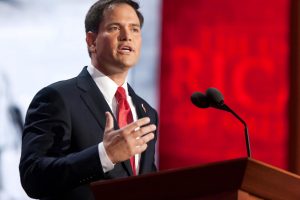By Antonia Vanzini

On Feb. 14, 2018, a mass shooting occurred at Marjory Stoneman Douglas High School in Parkland, Florida. It was one of the worst school massacres in history with 17 people killed and 14 wounded. Nikolas Jacob Cruz, the 19-year-old perpetrator, was identified by witnesses and arrested shortly afterward.
After the event, Florida legislators proposed and voted for a newly structured plan: the “school marshal program.” Its total cost would be $67 million, which will be used to train and arm teachers in districts only with the stated and documented permission of the local school board. Apart from coordinating administrations and school officials, the legislation would put new limits on gun purchases; it would impose a three-day waiting period and raise the age for anyone to buy a gun from 18 to 21. Its provision of $400 million would help to finance psychological departments in every public school; school resource officers and mental-health counseling would no longer be an option.
Arming teachers would not be the answer. We cannot solve a problem by using the problem itself. Taking weapons away from students and giving them to the teachers would just exchange fire for fire. Moreover, training sessions would not be sufficient. Most of the participants would not be psychologically ready to use the weapon, even if they technically have perfect understanding of how to do so.
The entire process would be cost-inefficient for most public schools in the country. Instead, these schools should invest in security programs, without resorting to this type of mass arming measure. School shootings have always been an issue in the United States; and they follow a pattern. The murderer is usually in his teenage years. He often has problems at school, hardly gets along with his classmates and could be depressed at home. Most occur in mundane places, like small towns and college campuses.
Politicians, experts and law makers are trying to adopt effective measures to guarantee higher levels of security in universities around the country to prevent these tragedies from happening again. People have addressed the issue in a variety of ways, from pacifist in-school protests to proposals of a complete overhaul of gun laws in the country.
“Everytown for Gun Safety” is an interesting example of a non-violent attempt to approach the matter and call for a definitive solution.
It is a nonprofit group, co-founded by Michael Bloomberg, that works to prevent gun violence; it is most famous for its running tally of school shootings. The organization explains on its website that it defines a school shooting as “any time a firearm discharges a live round inside a school building or on a school campus or grounds.”
Gun control needs to be based on the implementation of effective laws. We should find solutions of two types: task-oriented and morally shaking.
The first kind becomes operative through legislative change. The government should do all in its power to state clearly and in giant characters that weapons should never be sold to teenagers without knowing in advance the exact purpose of that purchase.
The second type of measures include protest rallies and pacifist attempts to confront and solve the issue. Therefore, college and university students should always be free to express their ideas, cooperate with their classmates to create a better campus environment and urge school officials to provide them with an adequate level of security. After politicians proposed the “School Marshall Plan” at Florida’s House and Senate Appropriations Committees, President Donald Trump supported the idea of arming teachers, though Senator Marco Rubio of Florida has said he strongly opposes it.
Residents of Parkland and survivors of the shootings have expressed their disappointment and are currently trying to protect the plan’s implementation.
One furious teacher, when asked about the proposal, said, “I love my students, but I didn’t sign up to take a bullet for them.”
Antonia Vanzini, from Catholic University of Sacred Heart, is an International Relations and Languages major from Milan, Italy.






































































































































































































